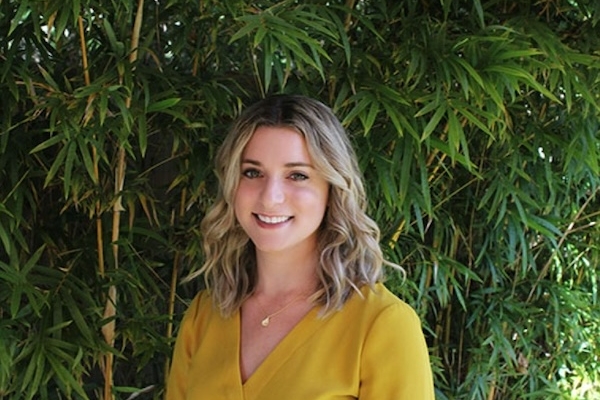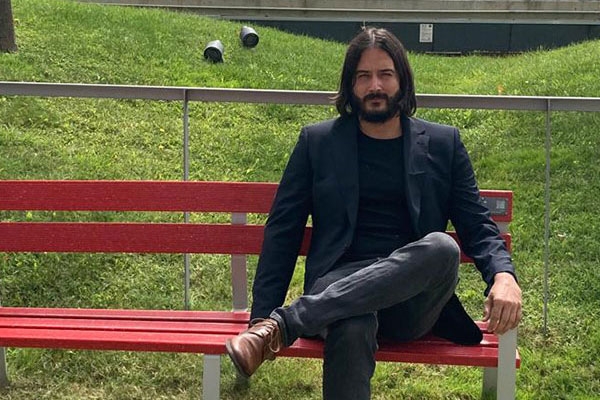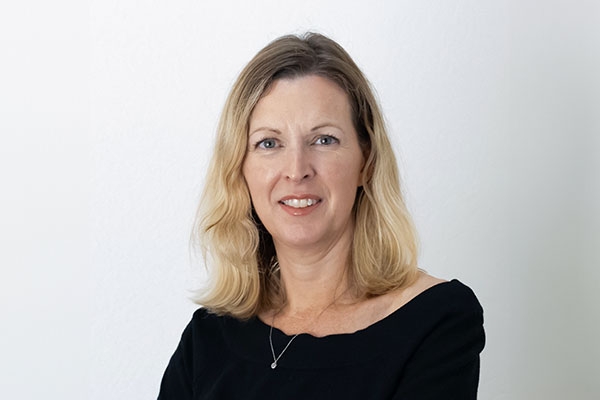Certificate Program in Finance instructor Powell Cappel did not take a direct route in his education, to say the least, to get where he is today—a 20-plus-year career in finance. In fact, this University of North Carolina at Chapel Hill graduate was originally interested in pursuing astrophysics when he began his undergraduate studies.
“I did well on my AP Physics exam and was placed into an upper-level course, Special and General Relativity, my freshman year,” Powell tells me. “I loved the subject but I scored a C. Panic ensued on both my end and my parents’.” [Laughs.]
“So I switched to chemistry to prepare for a career in medicine.”
Okay, so how does one with an A.B. degree in chemistry become interested in finance? Deciding not to attend medical school after all led Powell down the path to a fruitful career in the business sector.
Superfund Leads to Super Fun Learning Opportunity
Powell focused his chemistry degree on his interest in environmental work instead.
“My first job was in the Environmental Protection Agency (EPA)'s Superfund toxic-waste program,” he recalls. “It was a great job; I was stationed in San Francisco and had a permanent warrant to enter facilities suspected of infringement. Just me, a biologist, a geologist and a soil engineer—a motley crew of nerds traipsing around the West Coast. We then took our data back to the office and created mathematical models of each site. It was super-fun stuff.”
Around this same time, Powell tapped back into another interest: Asia. “I had studied Chinese language in college and was interested in Asian history,” he recalls.
“While in San Francisco, I applied for a Rotary Foundation Fellowship. To my complete and utter surprise, I got it and was sent to study for two years at the National University of Singapore (NUS).”
This fellowship combined with his chemistry background led to his next job opportunity.
“I was hired by a consulting firm leading the privatization of a petrochemical facility that was owned by the Singaporean government,” he recounts. “It was my first exposure to anything finance-related. I did sheer grunt work: putting together spreadsheets for cash-flow projections, inspecting facilities, coming up with market projections for downstream products. I learned a lot more than I gave back to the company. There was no instruction; I was just thrown into the situation and told to figure it out.”
Later, Powell was sent to London and Budapest to work on other chemical-related privatizations. It was also around this time when he had another revelation.
Graduate School Bound
“These financial tasks were a bit muddled in my head,” Powell admits. “I really wanted to take proper courses to make some sense of it all, so I applied to M.B.A. programs back in the States.
“The Wharton School at the University of Pennsylvania seemed to be the most international of the schools that I applied to,” he says. “Back then it was called the Wharton School of Finance. Seemed to click all my boxes.”
What about finance drew Powell to focus on this area of business?
“I thought derivatives were the coolest thing on earth at the time!” he enthuses. “Plus, compared to most of my classmates at Wharton, my mathematical skills were a little more advanced. I drifted toward what I excelled in, I guess.
“I also still had a keen eye on returning to Asia and knew that finance backgrounds would be in high demand.”
Adding More Finance Career Experience
After graduating from Wharton, Powell was hired by Chase Manhattan and completed the company’s sales and trading program. But the “shininess of New York City” dimmed after a few years, so Powell resigned in 1994, flew to Hong Kong and found a job with Bank of America as a fixed-income analyst.
His career ascent in the Asian financial services industry had begun.
-
Desk Analyst: “My first job was to research new bond underwritings and provide coverage of existing bonds held by the trading desk. These were all Asia-Pacific issues, except for Japan.”
-
Portfolio Manager, Emerging Markets: “After two years, I was hired by Credit Suisse in Hong Kong to become a portfolio manager for their North Asian fixed-income holdings, mainly convertible bonds. Basically, my job was to manage portfolio risk spanning China, Korea, Taiwan and the Philippines. I had a team of research analysts reporting to me based in Shanghai, Seoul and Hong Kong. I learned a lot about sovereign risk, equity derivatives and hedging techniques.”
-
Director, Structured Finance: “In 2007, I joined a structuring team at Barclays Capital in Singapore, where we underwrote privately placed bonds/loans that had different types of optionality, mainly equity-linked. We hedged these instruments by entering into derivatives contracts with hedge funds. It was a lot of fun, but then the 2008 financial crisis came. I moved into distressed-bond trading, which gave me a dose of valuation experience until the global economy recovered. I then went back to structuring private notes.”
-
Executive Director, Credit Trading: “In 2011, I joined UBS, also working as a structurer for new bond issues. My job was to instigate due diligence, structure, execute and de-risk initial bond offerings that UBS was taking to market.”
-
Managing Director: “I founded Raintree Capital Pte Ltd in 2014 to fill what I saw as a hole in many investment banks’ business strategies. At UBS, I was constantly being asked by the private banking staff to underwrite their clients’ debt issues. But my supervisors would restrict me from helping, saying it was below our investment banking thresholds. Meanwhile, UBS’ Private Bank had as clients some of the richest families in Asia. I was approached by sales reps from competing banks, saw there was a market and left UBS. I developed a niche in solar-power farms due to the massive subsidies being offered in several SE Asian economies.”
As the investment banks started paying more attention to their own private banking units, it became harder for Raintree Capital Pte Ltd to compete as a small, one-off firm. And around this same time, Powell’s eldest son was nearing high school age. “My wife and I had made a pact that both of our sons would attend high school in the U.S.,” he says.
That window was closing.
Teaching Finance for Extension
In 2015, Powell’s family moved to the San Francisco Bay Area.
“I went back and forth a few times to wind down things in Asia,” he says. “By 2018, I was free and clear to pursue something else.”
So he applied to teach finance courses for UC Berkeley Extension.
“I liked the idea of teaching at Berkeley because the students have a very international background and it would require me to get my own theoretical framework in order.
“You need to be fully committed to a subject to teach it.”
“Investment Portfolio Management is very relevant, very hands-on.”
Powell teaches several courses for us in the Certificate Program in Finance, two of them being International Finance and Investment Portfolio Management.
“International Finance spans a huge subject area but my favorite elements are the derivatives markets,” he reveals. “Innovations like currency swaps, foreign exchange (fx) options and interest-rate swaps have made international business a lot less risky. It has allowed many companies to shop the world for the best financing terms, making borrowing and equity issuance more efficient.
“We also employ derivatives as a speculative device in the course, using real market prices. I think the students enjoy this—maybe too much! But it is eye-opening to see the dark side of derivatives, how fast and powerful they can change PnL (profit and loss) and even markets. It’s a good lesson experience on paper and not in real life,” Powell adds.
But it is our Investment Portfolio Management course, which Powell has taught for two years, that continues to be a popular draw with finance certificate students.
“Investment Portfolio Management is very relevant, very hands-on, and the final goal is to create your own fund,” he explains.
“What I love about this course is that Modern Portfolio Theory (MPT)—which is essentially what the course is based on—is an approach that is grounded both statistically and psychologically. The students gain detailed understanding of the individual pieces—stocks, bonds, derivatives—and then use MPT to put the pieces together with the goal of maximizing return as a function of risk. Students learn about execution of trades, hedging and performance measurement.”
Powell incorporates his financial work experience into these courses, which is important for understanding topics such as investment management. But he believes that the most important aspect of learning about the field, and ultimately having a career in it, is “to fundamentally understand what you are investing in: how it is valued, what types of institutions or individuals trade it, how it is hedged.”
He explains, “When managing a portfolio of convertible bonds, I had to value both fixed-income and equity elements. I also needed to know exactly how I would hedge it and what risks it would face while held on my books. Finally, I had to understand how to liquidate it—fast if need be. Sometimes a small hole will only allow so much liquid to pass. One needs to understand the regulations, buyers and operations of exchanges to gauge this. It can vary worldwide. I have had court orders in some countries staying our sell transactions. Or challenges to our actual ownership of assets.”
And what does he say is the most important takeaway from Investment Portfolio Management for students? Learn to stay invested.
“For all investors, the most important thing, statistically, is to stay invested for long periods of time,” he advises. “This is not easy when markets are falling. We all have limitations to how much losses we can, as human beings, endure. A key concept of Investment Portfolio Management is that it is not just the performance of a portfolio over time, but also its pathway. The course gives students techniques to construct investments that provide diversification, are economic-cycle appropriate and give you the best return for the least risk.”
Talking Futures
What about the future? For starters, while Powell teaches in our live online format, he can’t wait to get back to teaching in person.
“I miss the classroom experience greatly. Hopefully, soon all will be back to normal. Until then, there are ways I’ve made it easier: tutorials, more vivid Excel models, more use of current/instantaneous market prices, et cetera.”
As for changes in the fields of investing and finance themselves?
“Cryptocurrency is certainly the biggest potential change for investing,” Powell speculates. “I still don’t understand how to fundamentally value it, but we discuss it in class. My students probably know more than me on this subject.
“For the field of finance, there are still a lot of inefficiencies that can be addressed by software and coding,” he points out. “For example, trading in loans and structured notes is still a very old-fashioned approach. There must be ways to make these instruments exchange-traded.
“Once in a while, some students send me homework solutions in coding script not spreadsheets—baffling to an old-school person like me. But it must mean if you are interested in finance, it wouldn’t hurt to have some coding skills. This may likely be a required skill in the near future.”
Until then, Powell will keep teaching what he knows and how he understands it all.



